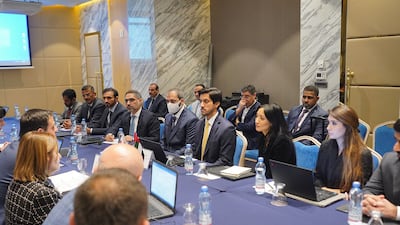The UAE and Georgia started negotiations towards a Comprehensive Economic Partnership Agreement (Cepa) this week as the Emirates looks to double the size of its national economy and push gross domestic product beyond Dh3 trillion ($817 billion) by 2030.
The talks were held in Georgian capital Tbilisi from September 26-28 and aim to boost trade, investment and economic cooperation between the two nations in line with the UAE’s foreign trade agenda launched in September 2021, the Ministry of Economy said on Wednesday.
“The UAE continues to explore economic partnerships with markets of regional and global importance. Georgia is a dynamic, free-market economy in the heart of the emerging Caucus region, and our relationships has seen real momentum in recent years,” said Dr Thani Al Zeyoudi, the UAE Minister of State for Foreign Trade.
The economies of both countries have “clear synergies” and complement one another, Dr Al Zeyoudi said.
Non-oil bilateral trade between the two countries more than doubled in the first half of 2022 to $166 million, from the same period a year earlier. It increased 118 per cent on 2020 and 85 per cent on 2019.
Bilateral non-oil foreign trade for all of 2021 between the UAE and Georgia increased 52 per cent to $223m from the previous year. It climbed 11 per cent on pre-Covid levels from 2019.
The UAE now accounts for 63 per cent of Georgia’s trade with the Arab world.
Mutual direct investment between the two countries exceeded $1bn by the end of 2021, with UAE investments currently representing 5 per cent of all foreign direct investment into Georgia, its sixth largest source of FDI, according to the ministry.
The Cepa talks will identify opportunities across agriculture, artificial intelligence, tourism, transportation, energy and other sectors.
“We will also work to create platform for SMEs, start-ups and entrepreneurs to scale and expand internationally,” Dr Al Zeyoudi said. “We are both entering these negotiations with a clear commitment to create opportunity, build on common interests and champion the private sector in both countries.”
Jumaa Muhammad Al Kait, Assistant Undersecretary for International Trade Affairs at the Ministry of Economy, is heading the UAE negotiation team on this tour, including representatives from all concerned authorities in the country.
The Cepa negotiations will explore removing or reducing tariffs and improving market access.
This will help accelerate the flow of Georgia’s principal exports, including cars, gold and semiconductor devices.
It will also provide opportunities for the UAE’s services sector, in particular logistics, education, ICT, finance and FinTech.
There are also opportunities to co-operate on food security and agriculture, advanced technology, hospitality, tourism, real estate and small- and medium-sized enterprises, the statement said.
The UAE has already signed Cepas with India, Israel and Indonesia, and negotiations are under way for a similar pact with Turkey to further boost international trade.
In April, the UAE and Turkey began talks on a deal that is expected to double bilateral trade from $13.7bn, the Ministry of Economy said at the time.
A similar pact with South Korea is expected to be finalised by the end of 2022. It aims to enhance the economic partnership between the two countries to a minimum of $20bn in the next three to five years.
The UAE is also holding Cepa negotiations with Kenya and the Philippines.


